|
|
|
Sort Order |
|
|
|
Items / Page
|
|
|
|
|
|
|
| Srl | Item |
| 1 |
ID:
116832
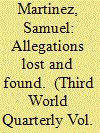

|
|
|
|
|
| Publication |
2012.
|
| Summary/Abstract |
In 2007 visual media reports revived allegations that sugar was being produced in the Dominican Republic using the labour of Haitian slaves. Beyond raising the general public's awareness of the plight of migrant sugarcane workers, the films and their surrounding publicity have led to the Dominican sugar slavery allegation being adopted in yearly global overview reports produced by agencies of the US Departments of Labor and State. The Dominican Republic has as a result been put back on an aid-and-trade-sanctionable track, more than 15 years after sugar slavery last featured as an allegation in any leading monitor group's reports. All this, plus evidence that one videographer knew central aspects of the allegation to be false at the moment of its public release, mark the revival of the Dominican sugar slavery allegation as a precursor to the media furor triggered by the Kony 2012 'viral video'. Analysis of the visual media afterlife of Dominican sugar slavery suggests that the 'Kony effect' may be less new than meets the eye, for Kony 2012 is not the first video campaign to promote yesterday's human rights crisis as today's imperative for action.
|
|
|
|
|
|
|
|
|
|
|
|
|
|
|
|
| 2 |
ID:
185330
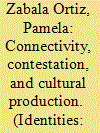

|
|
|
|
|
| Summary/Abstract |
In this paper, I employ thematic analysis of text data from a web forum to highlight the prevalent debates and themes that emerge in online discussions of Dominican identity. I find that these spaces can be arenas for identity contestation where what I refer to as traditionalist understandings of race and culture clash with non-traditionalist perspectives. When this happens, users rely on a number of strategies to rouse cultural memory, evoke racialised emotions, and establish cultural legitimacy. Forum participants create digital imagined communities where they can perform and share the particularities of their culture, while producing new conditions of cultural legitimacy and belonging. As technological innovation provides new platforms where diasporic and non-diasporic members of a nation can come together, it is important to continue to explore the role of online spaces as sites of cultural production.
|
|
|
|
|
|
|
|
|
|
|
|
|
|
|
|
| 3 |
ID:
073440
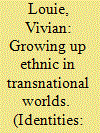

|
|
|
|
|
| Publication |
2006.
|
| Summary/Abstract |
Transnationalism refers to the phenomenon of immigrants maintaining connections to their country of origin and using a dual frame of reference to evaluate their experiences and outcomes in the country in which they have settled. How does transnationalism matter in the identities among the second generation? This article argues that growing up with parents who want children to participate in their homeland imaginary and in a strong transnational social field does not necessarily mean second-generation Dominicans and Chinese will themselves adopt transnational orientations and/or practices. I find that my Chinese respondents, because of authoritarian parent-child relationships, relative loss of the ethnic language, and scarcity of contact with their parents' countries of origin, viewed themselves as mainly ethnic subjects. Identities for my Chinese respondents involved a generational- and class-specific ethnic identity grounded in the enclaves and perceived rarefaction vis-à-vis mainstream America. My Dominican respondents, because of greater communication within the family, ethnic language maintenance, and the very frequent number of trips they made to the Dominican Republic, drew from both transnational and ethnic orientations, meaning they situated who they were within both national contexts. Although my Dominican respondents acknowledged the differences between Dominicans "back there" and themselves, they spoke cogently on class, gender, and the color line there as well as here. At the same time, their identities were informed by their pan-ethnicity in the United States, namely, how Latinos and Dominicans, in particular, are perceived.
|
|
|
|
|
|
|
|
|
|
|
|
|
|
|
|
| 4 |
ID:
128543


|
|
|
|
|
| Publication |
2014.
|
| Summary/Abstract |
This article argues that U.S. occupations in the Dominican Republic, Nicaragua, and Haiti in the first third of the twentieth century lasted as long as they did for political reasons. U.S. military commanders disagreed with civilians in the State Department partly because of a lack of both policy guidance and interdepartmental coordination. In addition, State grew more sensitive than Navy to negative public opinion both foreign and domestic and to national political strategy. Marines, meanwhile, were more driven to reform the societies they occupied but also less sensitive to their own abuses, to changing norms, and to geopolitical reasons for ending occupations.
|
|
|
|
|
|
|
|
|
|
|
|
|
|
|
|
| 5 |
ID:
144693
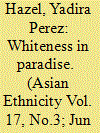

|
|
|
|
|
| Summary/Abstract |
In the 1950s, the Dominican government, under Rafael Trujillo, offered free land to Japanese immigrants to settle along the Dominico-Haitian border. The Japanese colonias, or agricultural colonies, were part of nation-building projects in the Dominican Republic (DR) and Japan, which positioned the Japanese colonias as the solution to both ‘the Haitian problem’ and overpopulation, respectively. However, over time the colonias failed, leaving many Japanese migrants disappointed and in need of navigating national identity between the two states. This article examines the ways in which the Japanese immigrants navigate shifting local and national interest, ideologies, and lived experience to file a legal civil action suit against the Japanese government for an unfound paradisiacal immigrant experience in the DR. The Japanese court-case provides a compelling case to explore how immigrants refashion national discourses of identity and collective legal action to hold natal government’s responsible for settlement while also embracing multiple national and ethno-racial identities in their new homeland.
|
|
|
|
|
|
|
|
|
|
|
|
|
|
|
|
| 6 |
ID:
126727
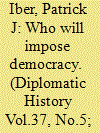

|
|
|
|
|
| Publication |
2013.
|
| Summary/Abstract |
This article examines the life of Sacha Volman (1923-2001), a Romanian exile who became a key conduit for CIA support to Latin America's anticommunist left during the Cold War. It traces the evolution of the front groups that underwrote his activities, his involvement with institutes for political training and the production of propaganda in Mexico and Costa Rica, and, most importantly, his organizing in support of the short-lived presidency of Juan Bosch (1963) in the Dominican Republic. The article argues that, contrary to traditional accounts, the Cold War environment and the actions of the United States provided certain opportunities for the political left in the region-provided, of course, that it was an anticommunist left. Yet CIA support was a weak form of commitment on the part of the United States. In the end, Volman's ally Bosch was overthrown and President Johnson sent troops to prevent him from being restored to power, while much of the propaganda produced by his movement was easily appropriated by the very powers that had deposed it. Acceptance of the hegemonic position of the United States and its anticommunist agenda-the same thing that gave social democratic parties their lease on life in the international arena-left them with little political flexibility.
|
|
|
|
|
|
|
|
|
|
|
|
|
|
|
|
|
|
|
|
|